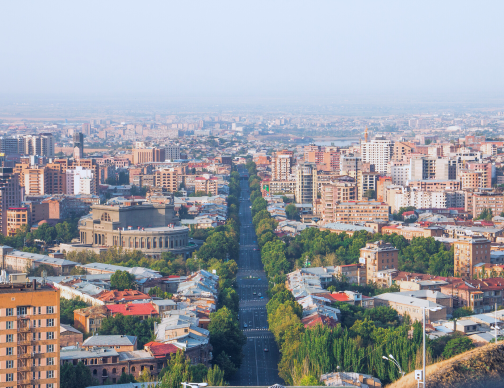Establish your presence globally with Neeyamo as we help you go beyond borders to manage your international payroll services and hire new talent in Armenia.
Overview
Nestled between Georgia, Turkey, Iran, and Azerbaijan lies the ancient country of Armenia. Rich in culture and history, Armenia not only values its past but also its future. Children studying in Armenia are taught chess as a compulsory subject. This stems from the fact that chess fosters logical reasoning and memory skills while imparting the valuable lesson of acknowledging defeat. Armenia already possesses a highly skilled and talented workforce and is nurturing future generations to follow suit.
If your organization's expansion plans require you to hire employees in Austria and you lack a physical entity in the country – a key requisite to hiring local talent, look no further. Global payroll companies like Neeyamo help with onboarding and managing employees in Armenia, along with processing a firm's payroll, payroll accounting, compliance, benefits, and more.
Tools And Instances
Facts And Stats
Capital
Yerevan
Currency
Drams (AMD)
Official Language
Armenian
Fiscal Year
1 January - 31 December
Date Format
DD/MM/YYYY
Country Calling Code
+374
Other Languages
Russian, English, German, French, Persian, Italian
Time Zone
Armenia Time Zone (UTC +04:00)
Global Payroll
Overview
Handling payroll for a widespread workforce can pose a significant challenge for any organization, and the added complication of compliance can make things worse. If companies spend more time processing payroll, it directly impacts day-to-day operations and their overall productivity. The solution to this is – a payroll processing company.
Over the years, Neeyamo has observed these complexities and strived to provide a global payroll solution through a single technology platform - Neeyamo Payroll. Neeyamo Global Payroll Services’ in-house international payroll software allows you to process payroll online in 5 clicks or less, making processing payroll in Armenia significantly easier.
How is payroll done?
Neeyamo acts as your personalized payroll tax calculator, ensuring adherence to local regulatory requirements using multi-level controls. Providing timely and accurate payroll, courtesy of our experts worldwide and using a tech-based integrated smart helpdesk solution with seamless support experience manned by payroll experts - Neeyamo has all your payroll needs covered.
Payroll Taxes
Payroll tax is the percentage amount retained from an employee's salary and paid to the government to invest in the general population's welfare. These are statutory in nature and are levied from both the employer and employee. Additional statutory contributions are made by employers towards providing both short-term and long-term benefits for their employees.
Employee Taxes
From 1 January 2023, the pension contribution payment should be calculated as follows:
- 5% of the monthly gross salary if it is less than AMD 500,000.
- 10% of the monthly gross salary (but not more than the maximum threshold) minus AMD 25,000 if the monthly gross salary is more than AMD 500,000
Total Employee Cost - 5% or 10.00%
Employee Income Tax - 21.00%
Flat Rate
Military Taxes:
- 1,500 AMD for salaries of up to 100,000 AMD
- 3,000 AMD for salaries of 100,000-200,000 AMD
- 5,500 AMD for salaries of 200,000-500,000 AMD
- 8,500 AMD for salaries of 500,000-1,000,000 AMD
- 15,000 AMD for salaries in excess of 1,000,000 AMD
Employer Taxes
Employers are not required to contribute towards social security in Armenia.
Payroll Cycle
Overview
Undoubtedly, payroll is a critical process for any organization. The pay cycle in Armenia refers to the period for which an organization pays its employees, and this can vary depending on the pay frequency that the organization chooses to adopt.
Frequency
The payroll cycle in Armenia is generally a monthly cycle, with wages paid on the 15th day of the following month.
13th Month Cycle
There is no mandatory or customary 13th salary payment in Armenia.
Global Work
Overview
An Employer of Record (EOR) service provider helps you eliminate the hassle of handling complexities while onboarding a new employee in an international location. They help bridge the gap that otherwise mandates organizations to have a local registered entity and a local bank account, prior to making a job offer to an international hire.
Providers of EOR services act as legal employers, facilitate salary payments, and manage other statutory requirements such as health insurance, payroll taxes, and employee benefits, ensuring compliance with local tax laws and regulations.
This allows organizations to focus on collaborating with the employees in Armenia for operational tasks, with the knowledge that they have a cost-effective solution to support their global payroll & HR requirements as they continue their global expansion.
HR Mandates and Practices
Minimum Wage
The minimum wage in Armenia for 2023 is AMD 75,000 per month.
Overtime
Employees earn 150% of their normal hourly rate for each hour of overtime work. Employees earn 130% of their normal hourly rate for each hour of night work.
Data Retention Policy
Armenia has a law on keeping personal employee records for income tax and what information should be kept, but no specific time frame for how long records should be kept is noted. Armenia's compensation and benefit recordkeeping laws could not be confirmed.
Hiring and Onboarding Requirements
Hiring
Labour legislation legally guarantees equality of parties of labor relations irrespective of their gender, race, nationality, language, origin, citizenship, social status, religion, marital and family status, age, philosophy, political party, trade union or public organization membership, or other factors unrelated to the employee’s professional qualities.
Onboarding
The following documents are required during onboarding:
- Candidate Full Name
- Address
- Contact Number
- Email Id
- Copy of Identification card
- Work Visa/Permit
- Educational Certificates
Probation
Armenian law allows for a maximum six-month probationary period. Both the employer and the employee have the right to end the employment contract with a three-day written notice during the probationary period.
Leave
Public Holidays
National Holidays
Below are the official holidays in Armenia:
- January 1: New Year's Day
- January 2: New Year's Day (Day 2)
- January 6: Christmas Day
- January 28: Army Day
- March 8: International Women's Day
- April 24: Genocide Remembrance Day
- May 1: Labour Day/May Day
- May 9: Victory and Peace Day
- May 28: Republic Day National holiday
- July 5: Constitution Day
- September 21: Independence Day
- December 31: New Year's Eve
Annual Leave
Annual paid leave in Armenia is minimum, extended, and additional.
The minimum annual paid leave in Armenia is 28 days. Extended and additional paid annual leave of up to 35 days (or up to 48 days in some exceptional cases) are granted to employees performing work in hazardous conditions, or in conditions of intellectual or emotional stress.
Sick Leave
Employees provide paid sick leave to their employees from the 2nd to the 5th day. After the 6th, employees are covered by social insurance.
Maternity Leave
Pregnant employees receive 140 days (70 days of pregnancy, 70 days of childbirth), 155 days (70 days of pregnancy, 85 days of childbirth) – of complicated childbirth, 180 days (70 days of pregnancy, 110 days) in case of having more than one child at a time. In case of premature birth, unused days of maternity leave are added to the days of maternity leave. The daily benefit is 100% of the insured’s average monthly earnings (regardless of the number of years of covered employment) divided by 30.4 (average number of days in a month)
Paternity Leave
Fathers can take five days of paid leave within the first 30 days after the child is born.
Other Leave
Voting leave: Employees are entitled to a paid leave of absence in the following cases:
- when summoned as a witness, victim, expert, specialist, and interpreter, by preliminary investigation bodies, the prosecutor’s office, and the court;
- when participating in court hearings as an employee’s representative.
Bereavement Leave: Employees are entitled to an unpaid leave of at least three days to attend the funeral of a family member.
Marriage Leave: Employers must provide employees with three days of unpaid leave in the event of their marriage.
Termination
Overview
Employers must have a valid reason to terminate an employee and must provide notice before doing so. The notice period is generally linked to the length of employment with the company.
Notice Period
The notice periods are as follows:
- Less than one year: 14 days’ notice
- Between 1 and five years of employment service: 35 days’ notice
- After 5 to 10 years of employment service: 42 days’ notice
- More than ten years of employment service: 60 days’ notice
Severance Pay
Severance pay is determined based on the grounds of termination, liquidation of the organization/reduction in the number of employees/recoveries of the employee in the previous job.
Employee average monthly salary for non-compliance with the position held/Long-term disability of the employee/The employee is entitled to an old-age pension/Significant working conditions to change/employee to be called up for compulsory military service.
- up to 1 year – 10 times the employee's average daily salary
- 1-5 years – twenty-five times the employees' daily average wage
- 5-10 years – 30 times the employee's average daily salary
- 10-15 years – 35 times the employee's average daily salary
- 15 or more years – 44 times the employee's average daily salary
Visa
Overview
- Foreign employees are generally subject to the same workplace and tax rules as Armenian nationals. They also have the same legal rights. For up to 180 days, people from countries in the Schengen Area can enter Armenia without a visa. For entry into and travel to Armenia, those from outside the Schengen Area must have a visitor visa. Currently, a visa waiver program allows entry for citizens of Belarus, Georgia, Kazakhstan, Kyrgyzstan, Moldova, Russia, Tajikistan, Ukraine, and Uzbekistan. If they have an invitation letter, citizens of Serbia and Montenegro may also enter under the visa waiver program. Some people, such as those entering Armenia on a contractual basis, foreign students, journalists, and researchers, among others, may be eligible for temporary residence in Armenia.
- The duration of temporary residence is one year, with a one-year maximum extension. Individuals entering Armenia for business must obtain a work permit sponsored by their employer to work in Armenia legally.
- Generally, a holder of an Armenian visa is not entitled to work in Armenia unless they also hold a work permit. However, some highly skilled foreign specialists, business owners, executives, and other workers are exempt from the work permit requirement. Unless a foreign individual is exempt from the work permit requirement, the employer must first obtain a work permit by applying to the Ministry of Labor and Social Affairs (MLSA) before the employee starts their employment.
- The MLSA tests the Armenian market to ensure that there are no qualified and available Armenian workers to fill the position internally. When a work permit is granted, the foreign national can start working in Armenia, but it does have a fixed term and is renewable on request.
- After obtaining the work permit, the foreign national must file an application for a temporary residence permit at the Passport and Visa Department of the Police in Yerevan. The application must be accompanied by the requested supporting documentation, including medical test results. The temporary residence card is issued within approximately 30-45 days of the application date if accepted.
- Specific individuals may qualify for temporary residence in Armenia, including those entering on a contractual basis, international students, journalists, and researchers. Temporary residence is granted for one year and can be extended for a maximum of one additional year.
Employee Background Checks
Legal and Background Checks
- In accordance with the general requirements of the Law on Personal Data Protection, persons with access to personal data shall not disseminate or disclose such data to third parties without the consent of the subject of the personal data (in this case, the candidate), unless otherwise provided under the law.
- Additionally, the processing of a candidate’s personal data assumes his or her written consent if the processing of the data relates to a decision about nominating or declining a potential employee. The agreement may be confirmed in a separate document signed by the applicant. Candidates’ personal data are not considered confidential if the candidate puts his or her CV on the internet or otherwise makes it available to the public.
- If an employer wishes to keep the candidate’s personal data or report his or her data to other employers, it must obtain written consent from the candidate.
Last updated on November 06, 2023
If you have any queries or suggestions, reach out to us at irene.jones@neeyamo.com
هل لديك استفسارات؟ ابق على تواصل معنا
تواصل مع أحد خبرائنا واحصل على عرض توضيحي سريع لخدماتنا








